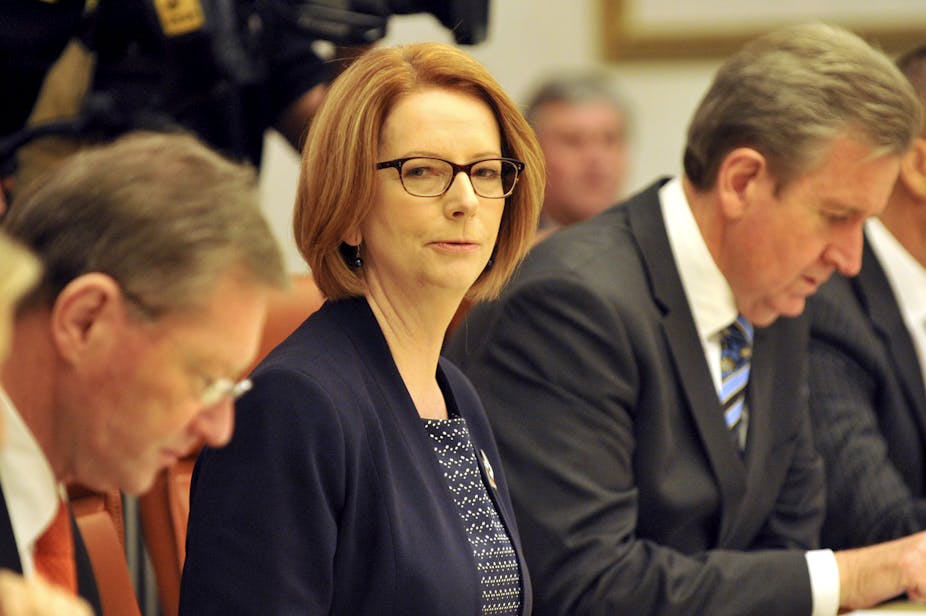The A$14 billion federal government proposal based on David Gonski’s call for a better school funding system has not been agreed to at this week’s COAG meeting. In fact, none of the states and territories signed up to the reforms.
The fact the states and the feds could not move forward is regrettable. Educators across the country now have to wait until June – the later deadline for government legislation – for the details.
It will simply add to the frustration and cynicism of those who have been waiting since the end of 2011, when Gonski submitted his findings to the Gillard government.
The delay has never been explained and for the many who care deeply about restoring fairness and lifting academic ambition in our public and low-fee Catholic schools, the folly of arguing all this out in a charged election year is a sore point.
A sustained advocacy campaign that involved all players might have helped promote something a bit more elevated than the usual neuralgic set of arguments around costs versus benefits. And it’s not as if the Government lacks fire-power.
Since 2008, the Commonwealth has poured A$2.3 billion into the Smarter Schools National Partnership deal with the states and this has been primarily aimed at boosting performance in our poorest schools.
It’s been an important Labor initiative. So why haven’t they told us about it?
It’s reasonable to assume that when state education ministers convene regularly with their federal counterpart, Peter Garrett, that these issues are discussed. I’ve no doubt that Garrett has put a lot of mental sweat into finding an acceptable funding formula, although it was notable, when Radio National’s Fran Kelly asked him whether he had picked up the phone and spoken personally to his state counterparts, he suggested that the detail had been left to officials.
It’s as if there is a willful avoidance of any kind of genuine engagement. There’s plenty of jaw-jaw but hearts and minds aren’t connecting.
Conversation readers who like to get their weekly fix of political argy bargy on a Monday evening by flicking the remote to ABC Television’s Q&A will recall the program last month that featured Garrett and his opposition counterpart Christopher Pyne in front of a specialist audience of teachers, principals, academics and pupils.
The questions were thoughtful and challenging, starting with one of the Gonski review panel members, Ken Boston’s point that Australia now has “one of the most socially segregated education systems in the world.” But both politicians weren’t up for real debate. A pity because it’s not often that a network provides an hour of prime-time on single topic.
There were plenty of bromides about the need for “quality teachers” but a complete political pass from both the Minister and his would-be successor when the last questions turned on the issue of adequate financing of the universities that are required to train our future educators in a demand-driven system.
Associate Professor Debra Hayes from Sydney University’s Education Faculty was one of the questioners and this week she got her answer. Universities, whether training teachers or anyone else, will, again, have to do it more “efficiently” and absorb a cut of just under a billion dollars.
The sector was not expecting another hit, after last year’s A$500 million reduction in research funding, and felt completely blindsided.
The sheer perversity of boosting school funding by taking money off the very institutions who train teachers - and now required to do so to new Government-mandated professional standards - is a point that’s been made by all Vice Chancellors this week.
Deb Hayes has no doubt about the outcome. “It means universities are likely to produce graduates who are less well-prepared to meet the challenges of working in schools, particularly complex settings where young people have not been well served by schooling, so its a pernicious cycle.”
Bigger lecture classes, fewer tenured academics, and more casual staff all take their toll, particularly when it comes to the all-important supervision of student teachers on professional placement.
“A dumb decision” is Hayes conclusion. And arguably, even dumber politics. Without a doubt last weekend’s announcement has made it that much harder for Labor’s Cath Bowtell to re-claim the inner city seat of Melbourne from the Greens’ Adam Bandt.
In spite of the stated ambition of the government for Australia to be among the top five high performing countries in the world by 2025, we seem to stubbornly ignore the obvious lessons from countries as diverse as Finland, Singapore and Canada. Their systems record premium student performance, not because of any one-off factors, but because policy-makers work hard to get everything right.
They start from first principles, negotiate a stakeholder consensus, work like crazy on effective implementation, eschew fads, and above all, invest for the long term. If we could find a way to emulate this, that would be news worth celebrating
Unfortunately, here in Australia, without the same kind of consensus and policy management, we are left with delayed reforms and very little time left on the clock. It’s clear much more work will be needed to get real education reform and a fairer funding system.

